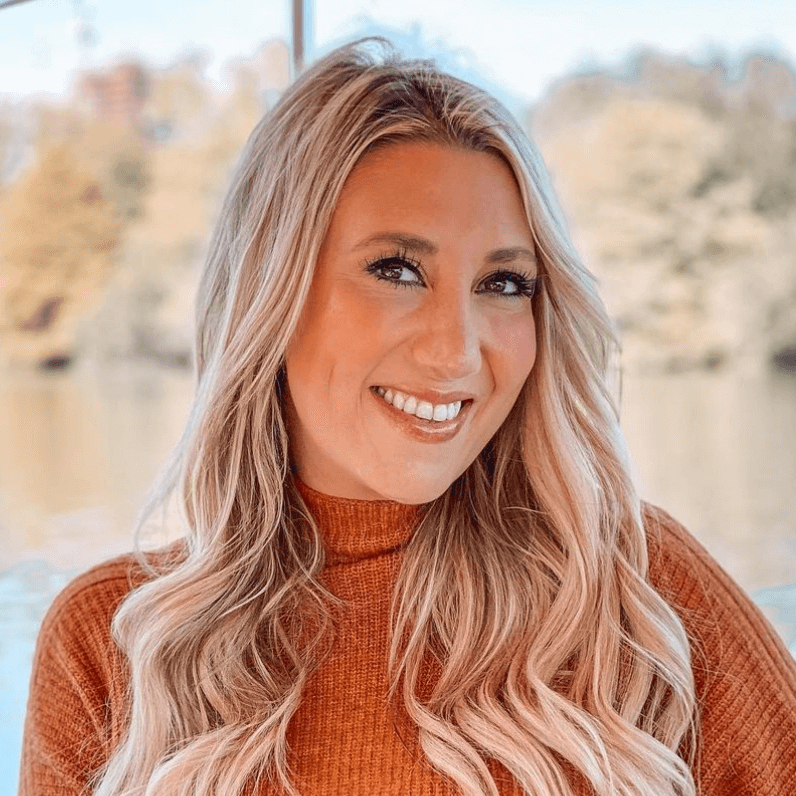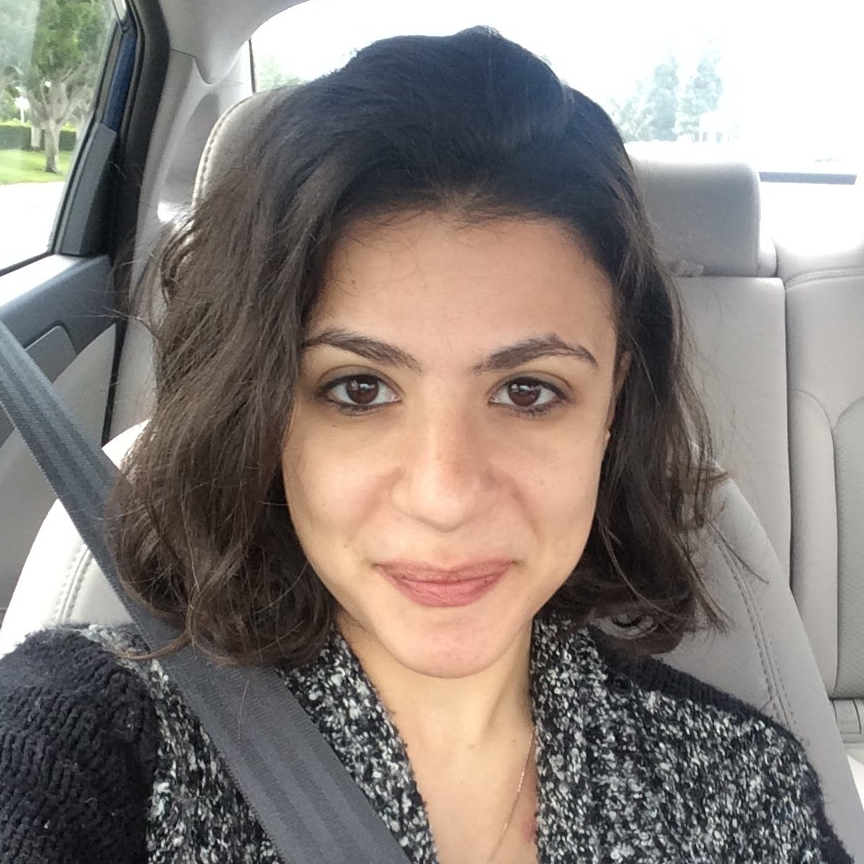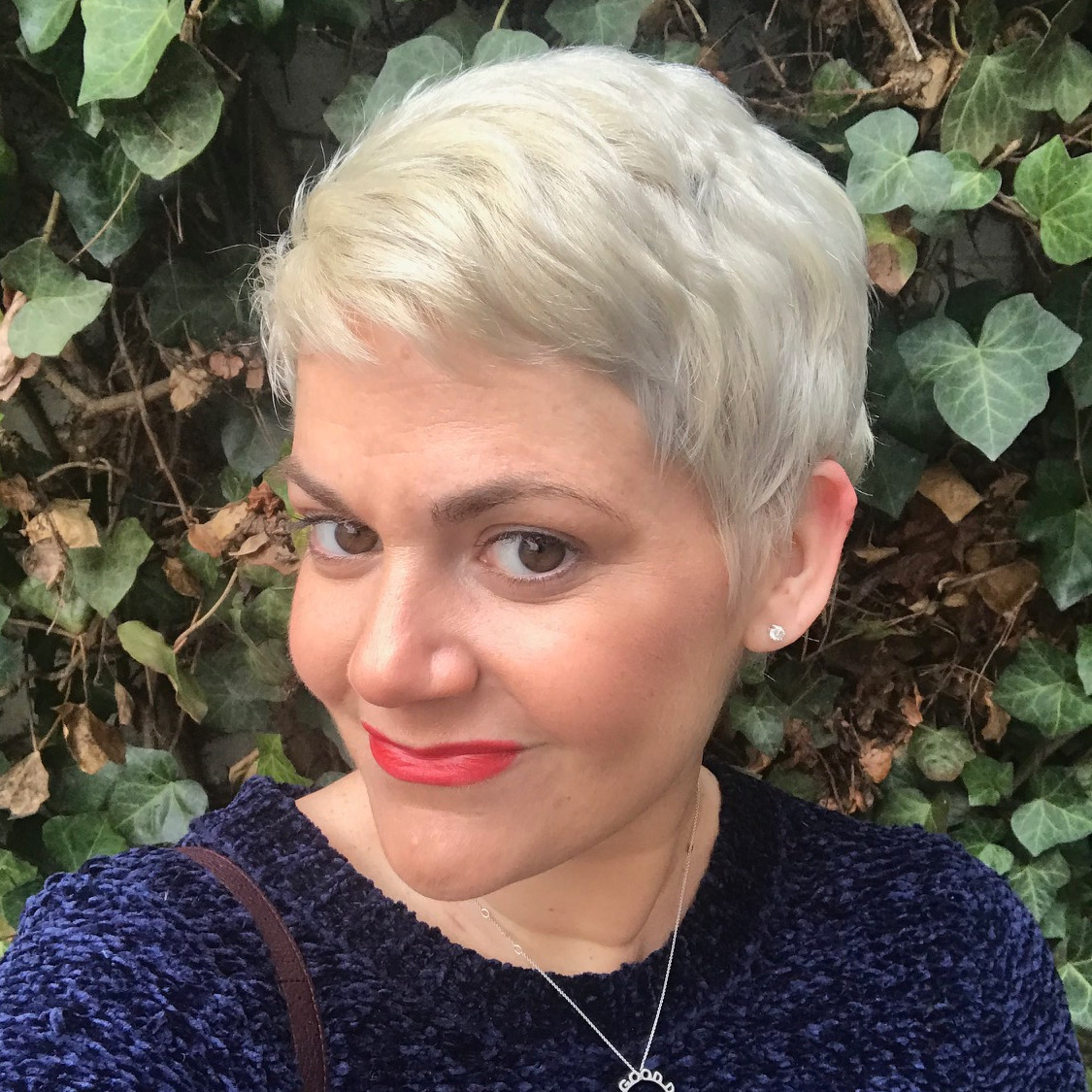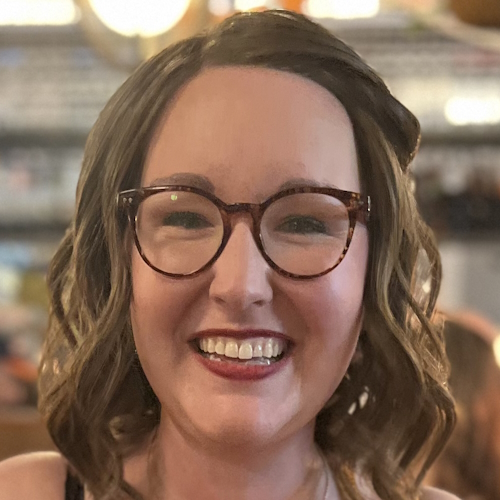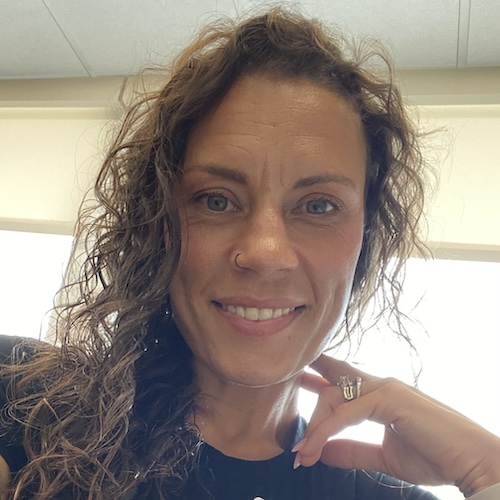Marissa’s Stage 3B Squamous Cell Cervical Cancer Story
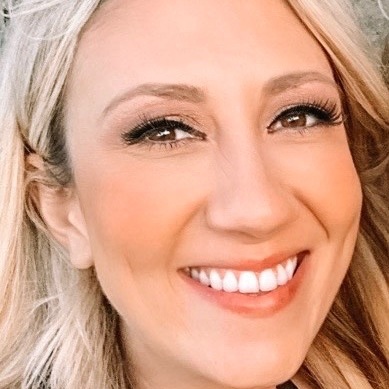
Marissa shares her stage 3B squamous cell cervical cancer story and how she managed through treatment, including chemotherapy, radiation therapy, and brachytherapy.
In her in-depth story, Marissa highlights dealing with scanxiety (waiting for results), mentally working through losing fertility from treatment, and what support helped her the most.
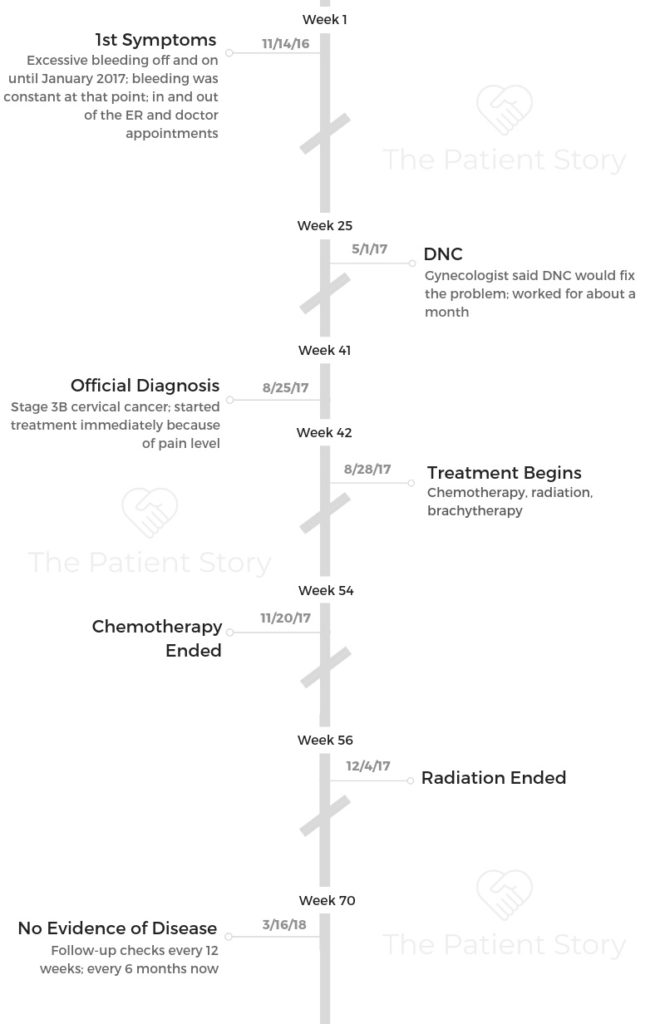
- Name: Marissa N.
- Diagnosis:
- Cervical cancer
- Squamous cell carcinoma
- Staging: 3B
- 1st Symptoms: Prolonged and excessive vaginal bleeding
- Treatment:
- Chemotherapy
- 7 rounds of cisplatin
- Only did 4 because of weight loss
- 7 rounds of cisplatin
- Radiation
- 28 rounds of direct pelvic radiation
- Every Monday-Friday for 5.5 weeks
- Brachytherapy
- 4 rounds
- Once every other week
- Chemotherapy
Having cancer has taught me to drink my coffee slower, to inhale the salty air while I am on the beach with friends, to forgive quickly and love loudly, to digest every single moment that I have on this earth.
I would never wish my past on anyone, but I would give my new outlook on life to the world.
Marissa N.
- Diagnosis & Testing
- What were your first symptoms?
- What happened when you went to the doctor?
- Seeing an OB-GYN
- What happened during the multiple ER visits?
- What was the transvaginal ultrasound like?
- How were you diagnosed?
- You hired a health advocate
- Did you get a second opinion?
- Is there anything you wish you had known during the diagnosis process?
- Any guidance for other patients?
- How did you process the diagnosis?
- When did you hear about the infertility?
- Treatment & Side Effects
- Reflections
- After treatment, you had to wait for more scans. How was that emotionally?
- How did you find out you were in remission?
- What helped you through the lowest times?
- What are the lasting side effects from your treatment?
- Did you lose your hair?
- Were there any surprises during treatment?
- What was the financial aspect of treatment like?
- What is your “new normal” after cancer?
- How did you come to terms with cancer taking your fertility?
- What is dating like for you now?
- Support
This interview has been edited for clarity. This is not medical advice. Please consult with your healthcare provider for treatment decisions.

Diagnosis & Testing
What were your first symptoms?
I’m kind of a unique story because unfortunately, my story ended up in a lawsuit. I won the suit, but for legal purposes, I can’t name my provider.
I have been very involved in my female health ever since I was a teenager. I got my first pap smear at 18. Anytime I was sexually active with a new person, I always used protection.
I was very aware of the possible repercussions of being sexually active. I always had my physical exams and had never had an STD or HPV.
In September 2016, I switched insurance companies and went to my primary care physician at the center I had gone to my whole life.
I got the typical female exam, pap smear, and blood work. I didn’t get a call back, which is usually a good thing. They say, “We’ll call you if anything comes up.” I didn’t get a call.
In November, around Thanksgiving that year, I started noticing some odd bleeding. I wasn’t on my period, and I wasn’t having sex, so I didn’t know where it was coming from.
In December, I started noticing bleeding every single day. I had just gotten off birth control, so I contacted my primary care physician and told her what was going on. She said it was probably just hormones.
I’m bleeding every day at this point. I was having to put a tampon every single day. By the end of the month, I started getting really paranoid and thought something was really wrong. I was negative for HPV.
This is why I think The Patient Story is so amazing. I was so naive then that I didn’t know any better. I wasn’t reading other people’s stories. I was just looking at the fact that I was negative for HPV.
What happened when you went to the doctor?
Into January 2017, I go in to see my doctor and asked her what was going on. I told her I was still bleeding every single day and was feeling so fatigued because of all the blood loss.
She did an exam and said, “Your cervix is irritated, but everything else looks fine.” She gave me a cream that was supposed to heal it. She said if that didn’t work, I needed to see an OB-GYN.
Seeing an OB-GYN
I did the cream for 7 days. The bleeding didn’t stop, so I went to the OB-GYN. They did an exam and didn’t know what was going on. They said it was my period acting funny or hormones or something.
From January until March, I was bleeding consistently every single day. I went to the doctor 4 more times, and they did one of many transvaginal ultrasounds I’ve had. They told me everything was fine.
I was starting to get even more worried, but at this point, the bleeding was just sort of the norm. I had never had problems with my period, but I’ve read about other girls who have.
I thought, ‘Well, okay. I’ve been so fortunate up until now, and maybe now I’m just having problems.’
April comes along, and I flew to North Carolina to get baptized. On that trip, I was gushing blood. Tampons weren’t doing the job anymore.
I got home from that trip, and I went to the emergency room. They told me they didn’t know what was wrong, but it’s probably still my period. I saw about 5 different doctors.
No one could figure out what was going on. The medical system I was going to was a big institution that I feel like does not give their patients the proper care they need. If you need an appointment, they just send you to whomever. Unless you are very sick or pregnant, you don’t have a primary care as far as an OB-GYN.
Around the end of April, I saw a new OB-GYN, who told me I needed a dilation and curettage (D&C, a procedure to remove tissue from inside your uterus) because she wanted to insert an IUD. She thought that would solve this bleeding issue.
When she went to insert the IUD, she couldn’t because there was so much blood. She did an entire exploratory thing, did the D&C, and she still missed the cancer. She told me the D&C and IUD would solve it. They did solve the long-term bleeding for about a month.
In June, it started again. I was bleeding every day and feeling fatigued. I was going to the doctor practically every other day.
From March until August, I went to the doctor more than 40 times to try to figure out what was going on with me. No doctor caught it.
In July, I was the maid of honor in a wedding. I went to the bachelorette party, and while I was there, I started having awful lower back pain.
I had just started a new job where I was sitting more, so I thought maybe that was why. I went to the ER before and after the party.
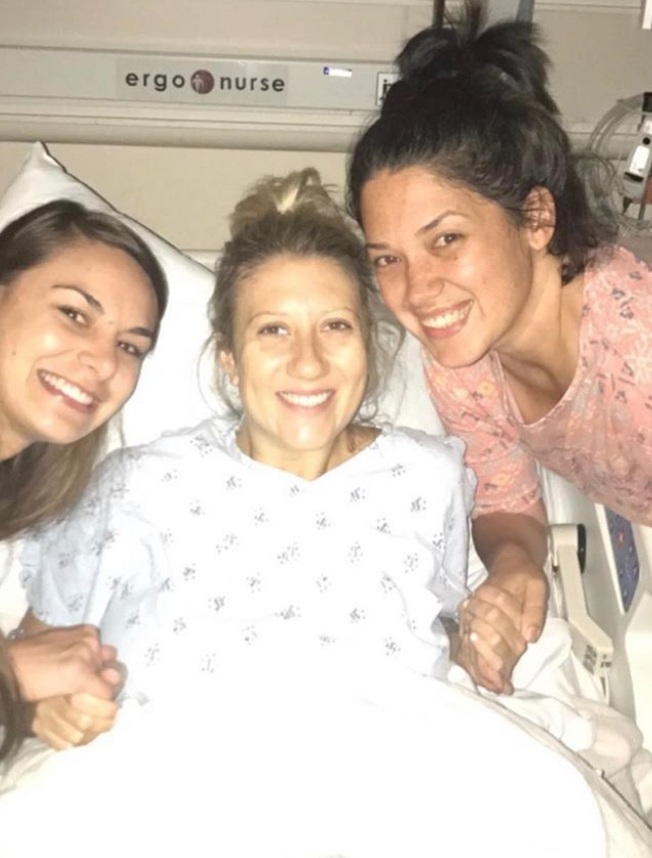
What happened during the multiple ER visits?
They told me my kidneys were failing. They didn’t know why, but I was in kidney failure. They gave me some medicine.
Come to find out, there was a tumor that was squeezing my kidneys and not letting the urine drain. They still hadn’t caught it.
Fast forward to the next weeks into August, I was going to the ER every day. At this point, they were telling me I had kidney stones. They were still missing this giant tumor that every surgeon I’ve talked to after said was clearly visible on my X-rays.
What was the transvaginal ultrasound like?
That’s where they take a scope and explore your ovaries and cervix. That’s what should catch any flare-ups or tumors that may not have been found. They looked from the outside and inside.
It’s very uncomfortable, but early on, the exam wasn’t bad for me. The scope is lubed, and it’s not very big. Once the cancer advanced, though, my area was so sensitive that it did become very painful.
How were you diagnosed?
On August 16th, I was admitted to the hospital. On August 25th, I was diagnosed with stage 3B cervical cancer.
They finally found the tumor and cancer through surgery and biopsy. They went in through my stomach.
They made 3 laparoscopic holes, so I didn’t have to have a big scar. They went in and found the tumor and took a piece of it for testing.
You hired a health advocate
After hearing my diagnosis, my parents hired a health advocate because we didn’t understand how it wasn’t caught sooner. The health advocate discovered that the pap smear that I had in August 2016 was positive for HPV, and the pathologist that read that test read it incorrectly.
It was kind of devastating because cervical cancer caught at an early stage can be completely treated with a hysterectomy or a scrape.
I would have been offered all of those treatments had my cancer been caught in time.
Since my cancer was advanced, they were only able to offer brachytherapy (internal radiation), chemotherapy, and radiation.
Did you get a second opinion?
I did. Because I needed treatment immediately, I began treatment at the first facility, which is the system that was involved in the lawsuit. I went to a different hospital for a second opinion. They agreed with my hospital’s treatment plan.
I didn’t switch treatment centers because I needed treatment immediately. My kidneys were a big issue, and I got nephrostomy tubes. Time just wasn’t on my side.
Switching centers wasn’t feasible for me.
I had already started chemotherapy and radiation at the first hospital when we found out about the misread test, so stopping treatment and going elsewhere wasn’t an option.
Is there anything you wish you had known during the diagnosis process?
An HPV test is important, but it can be read inaccurately, obviously. The first thing I would do if I could go back would be to push to get tested again.
One thing I found later on a cancer board and wish I would’ve done is take a tape recorder.
A girl in one of the boards I’m a part of said she took a tape recorder in with her. When she asked to be retested, they told her no. She said, “Okay, I’m going to record this conversation. If you think I don’t need to be retested, I just want to do my due diligence.” She said they immediately said they would retest her.
Any guidance for other patients?
If there’s any advice I could give my past self or someone else in my situation, it would be to fight for those second and third tests. HPV comes in waves. My screen showed positive for cancer, but it very well may have not on another test.
Your body is always fighting HPV, so it doesn’t always show up on a test. Push to get tested and retested. If the doctors don’t agree to retest you, you can request that they put it in writing or record the conversation.
»MORE: How to be a self-advocate as a patient
How did you process the diagnosis?
I had a huge tumor that was hitting so many nerves on my cervix. I was on Neurontin and Dilaudid, which are pain killers. I was on so much pain medication that I became cross-eyed.
I was talking to people who weren’t there. Nurses didn’t want to work with me because they had never seen a patient like that before.
I was so incoherent that my diagnosis didn’t hit me until a few weeks later. I was so hooked up to machines. People were visiting, and I really didn’t know what was going on.
The only conversation I vividly remember during that time was the day I found out I was going to lose my fertility.
»MORE: Patients share how they processed a cancer diagnosis
When did you hear about the infertility?
A woman came in. My mom had stepped out of the room, which was a godsend because she’s amazing and loves her grandkids, and I think having her hear that her only daughter wouldn’t be able to conceive would’ve been as awful as hearing the news myself.
A doctor was holding a piece of paper and scribbling on it. She said, “If we try to start preserving your fertility and pause your treatment, that could have really negative repercussions for you and allow your cancer to spread.”
I remember thinking, “You’re drawing my fertility or lack thereof on a piece of paper. How could you do so on a piece of paper with a pen?”
She left, and I started crying. I was very upset, but I hadn’t come to terms with it by any means like I have now. Out of all the days, that was the day I was the most upset.
»MORE: Fertility preservation and cancer treatment
Treatment & Side Effects
Can you talk about the nephrostomy tubes?
It’s kind of like a colostomy bag, but for your kidneys.
The tube goes into your back with a bag hanging out, and it drains your kidneys. My tumor had grown up my ureter, and that’s why my kidneys were swelling.
I had been having the most excruciating pain of my life when I peed, and this was even after the tubes. It’s like a UTI on steroids. The tubes relieved back pain I was having, but it didn’t fix the pelvic pain.
As far as the actual procedure, they take you down to urology to a procedure room. They cut a hole in your back and put a wire into your kidney, and that makes a vibrating feeling. I was awake for that.
Your body develops a type of cast around the tube and kidney, so it gets easier. It’s uncomfortable, of course, but it’s not painful.
When you have nephrostomy tubes, you have a few options. Sometimes, when your body heals from cancer, you can get them removed after treatment. My tumor healed, but it turned into cement. I had to have reconstructive surgery.
They took my ureters and connected them. When they did the reconstruction surgery, everything was fine, and I got the bag removed.
I got a blood test done about a month after, and my creatinine levels were very high again. The doctors found that both sides had blocked up again, so they had to insert tubes into both sides.
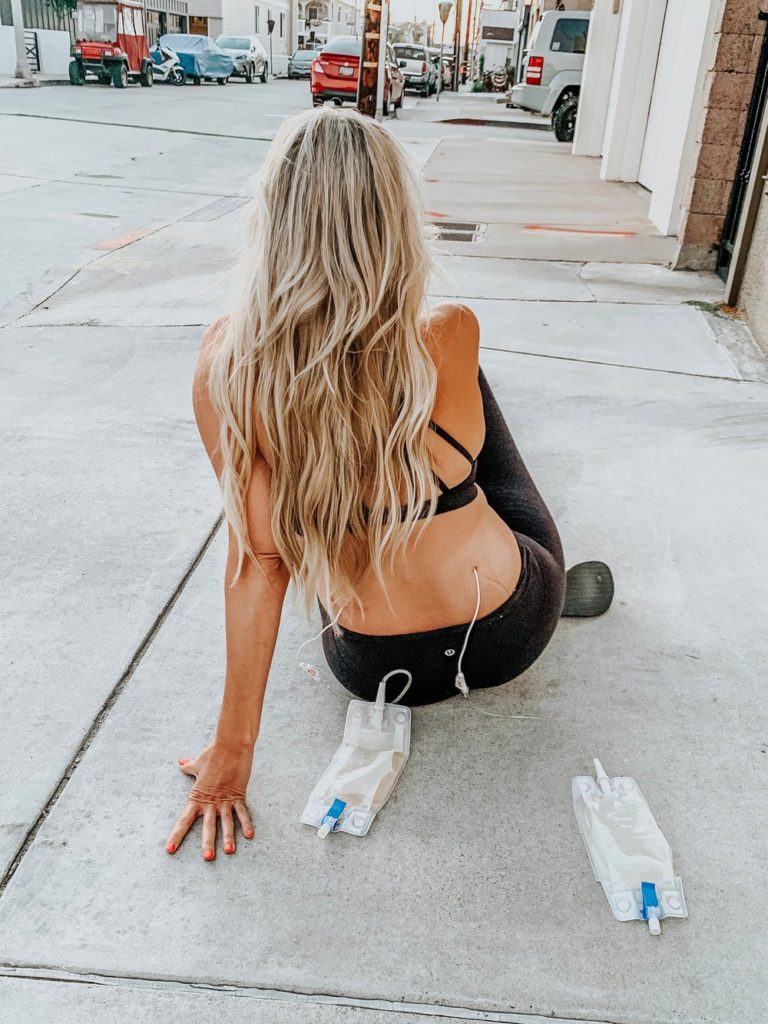
What was your chemo regimen like?
Cisplatin was my main drug. There were other ingredients in the cocktail, like steroids, I guess. Cisplatin and radiation made up my treatment plan, though.
I was supposed to get a port inserted, but my doctor never made the order. I had already had 2 infusions of cisplatin, and you only do 7 rounds. I chose not to get it because I didn’t see the point. All my chemo went in through a central line.
I started chemo 2 weeks after I was diagnosed, and I was already in the hospital. The times after that, I was driving to and from the hospital. Each infusion took about 8 hours, so it was an all-day thing.
What were the side effects from chemo?
I had infusions on Tuesdays, and I didn’t typically get sick until the weekend. I would be fine for a few days, and then Thursday through Monday, I’d be throwing up and so sick. Tuesday would hit, and it would start again.
The worst side effect for me was loss of appetite. I couldn’t eat a thing. I got skinny quick.
It’s funny because you spend your whole life wanting to lose weight and then realize how unhappy you are. I had no energy and was all bone.
I weigh a healthy 155, and I got down to 106 pounds very quickly because I was so sick. Because of that, they encouraged me to stop cisplatin.
Altogether, I did 4 rounds of chemotherapy. I stopped in November, and they told me we would resume in January after a month off. I was so sick at that point that I decided not to continue the cisplatin and to just do the radiation.
The reason I didn’t do chemo later on when I started feeling better is because cisplatin is only typically successful if it’s in combination with radiation. By the time I started feeling a little better, I was getting close to ending radiation, so the cisplatin would essentially be for nothing.

What was the plan for radiation?
Radiation was 28 cycles of direct pelvic radiation. I went in Monday through Friday for 5.5. weeks straight. At some cancer centers that are less busy, I’ve heard you get seen right away.
Sometimes I had to wait 30 to 45 minutes, but the radiation itself only lasts about 15 minutes.
Describe the radiation process
They give you 3 little tattoos on your stomach so they know where to line you up every time they go in. It was like getting a real tattoo.
You’re not supposed to wear anything with metal. I developed a stash of ‘cancer clothes’ really quickly.
I wore the most comfortable pair of underwear I could find, sweatpants without any metal, a sports bra, and a comfortable T-shirt.
You go in, and they weigh you and all that stuff. Then you lay down on your back. They position you to where your tattoos match up with the laser gun or whatever it is.
Then it begins. It doesn’t hurt at all. A lot of times I would just fall asleep, or they would play music if I wanted them to.
What were the radiation side effects?
My side effects from radiation are ones I still have today. My chemo side effects were less intense. It was like I got sick, I got over it, and it was done. Radiation damaged my bladder to 50% function, so I can’t hold my urine long at all. I also have incontinence, so I leak sometimes, too.
I lost a lot of bowel function. I was extremely constipated, and the stomach pain from that was so awful. I wasn’t eating, so on top of that, I had the worst stomach cramps. Whereas some girls get really bad burns, I didn’t get any of that. I got very tan randomly, but that was it.
I have a ringing in my ears. It’s staticky, and then it’s ringing. I have an irritability to high-frequency sounds. If someone is scraping a bowl, it sounds like scraping on a chalkboard on steroids.
However, radiation isn’t as bad as it seems. Brachytherapy? That was awful.
What was brachytherapy like?
I did brachytherapy 4 times, and it was every other week. It was in combination with the other treatment, which is 7 cycles of cisplatin and 28 cycles of radiation. You go into this room, and it’s the most uninviting space ever.
I never left an appointment without my mom crying because it was so bad. They lay you down. I didn’t have a port, so they had to give me an IV to put me to sleep. I had such a big tumor that I was having so much pain at this point still because it hadn’t shrunk enough.
They could never get the IV in the first or second try. To this day, because of the chemo, they still can’t get a needle in my arms. They have to go through my hands. It was awful, and I was always crying.
They put me to sleep, but I would wake up so sore. By the time you wake up, you’re back in a different room with a pad on.
Basically, what they’re doing is they’re inserting a metal device into the vagina and hitting the tumor directly. It caused me a ton of nerve damage and pain.
The impact to your sex life post-brachytherapy
What happens after brachytherapy is your vagina loses elasticity. Having sex becomes limited because the vagina is no longer elastic like before. That’s a lasting side effect. They give you something called a vagina dilator. It’s a fancy term for a dildo. I didn’t start using mine until way later.
To this day, when I have been sexually active, it’s no longer a nice experience. I’m not sure if that’s from radiation or brachytherapy, but I assume it’s a combination of both.
All the girls that talk about it on cancer boards I’m a part of say the best advice you could give someone is to use your dilator.
Your vagina can actually close up because it’s getting so much radiation. I’ve talked to girls who have had to have an additional surgery because of that.
Reflections
After treatment, you had to wait for more scans. How was that emotionally?
It was interesting in December. That was when I was the sickest, and it’s also when I felt the most alone.
In the beginning, everyone is there for you. Everyone’s posting on their social media about you.
Everyone is concerned and asking how you are. Slowly, their lives move on.
I would say that I am a social butterfly. I have a lot of friends. I had a very hard time with the realization that I was in the battle alone. I had a lot of emotions. Before, I had been fighting the physical stuff, and at that point I was fighting the emotional stuff.
I finished treatment completely in December. In January, they said I couldn’t have a PET scan until late February because radiation was still active in my body. They didn’t want to do a PET scan until they felt the radiation had run its course.
During that time, I was just waiting and trying to gain some weight. I started smoking a lot of weed. I think I was high all day every day for a while. It was the only way to get out of the depression I was in. I was on Instagram and would see my friends out and about, crying nonstop.
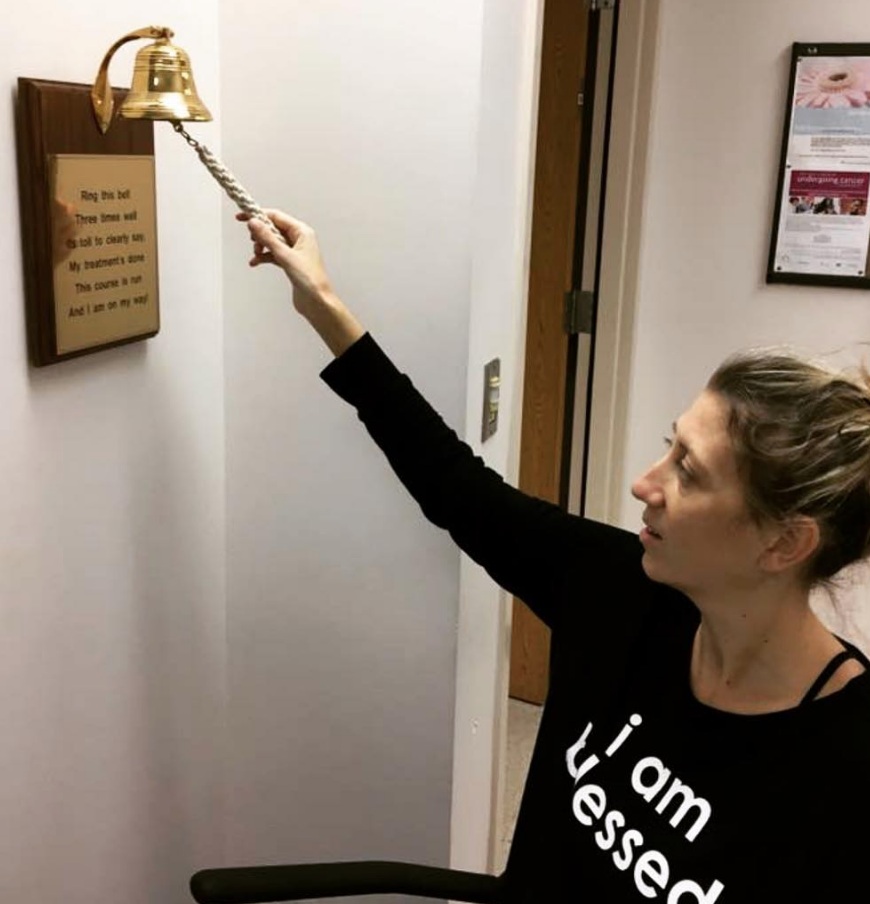
It was absolutely the lowest point of my life. I consider myself a religious person, and I would pray that I would just die because I couldn’t live my life like that.
I felt like a burden. I felt like my parents couldn’t live their lives because they were so hung up on me. I felt like there was no point in living. I didn’t see the point.
January was a blur. I hope that nobody ever experiences a time like that. It was definitely the worst time of my life.
»MORE: Dealing with scanxiety and waiting for results
In February, I still had been smoking a lot of weed, but I guess it wasn’t good weed. My dad told my friends, “You need to get Marissa out of the house. She’s not doing well.” At that point, they were going to have an intervention.
For whatever reason, I smoked a joint that day that got me so stoned. My friends and I all got high together, and I laughed the hardest I have ever laughed in my entire life because of it. After that, I never looked back. Suddenly, I started putting on weight because I was eating more.
How did you find out you were in remission?
I did the PET scan. I got a call on March 4th. I was expecting the call. I didn’t want to get bad news in front of anyone else, so I shut the door and answered it.
My doctor said, “I’m sorry, your body still has cancer. The treatment wasn’t completely successful.”
For anybody who has cervical cancer, your treatment of choice is radiation and chemo. Once that’s not successful, it’s basically about keeping you alive.
You have a one-shot chance. If it’s not successful. your options are really limited. I was really sad. I went to my friend’s house that day, crying but still hoping everything would be okay.
Well, they did biopsies a few days later, and they came back negative. The PET scan was showing residual tissue. The cancer was actually gone.
We had a scare, but then we got the good news on March 16th.

What helped you through the lowest times?
When you’re in treatment, it’s awful because you feel alone. You feel like all your friends are going out and having so much, and you’re just sitting there being sick.
Suddenly, you’re noticing all these baby announcements. You never notice them, but now you see them and realize you’re never going to have a baby.
That was the lowest point for me, for sure. Recently, I found out I needed the second nephrostomy tube. In my life, I’m reminded daily that I’m different than others.
Dating is different. How do you tell somebody you can’t have kids? How do you tell somebody that sexual experiences are very vulnerable thing for you? My friends pass judgments if I’m drinking or going out too much or sleeping too much.
I’m finding friendships that no longer work. I’m reminded of that trauma constantly, and that brought a new low. No amount of money, no amount of justice, no amount of any material thing will give you peace.
That’s why you have to focus on your mental state and your own well-being. A lot of times, the connections you find with other survivors is what’s going to keep you going.
»MORE: What kind of support cancer patients say helped the most

What are the lasting side effects from your treatment?
The worst side effect is the menopause. When you go through radiation, it throws your body into menopause.
I get really bad heat flashes, I have very little sexual desire, I have pretty intense mood swings, and I no longer have periods, which could actually be a good thing, I guess. That’s the worst one for me.
After that, the vaginal elasticity is bad, too. When I was in a relationship and sexually active, the pain would never go away completely. I did get used to it.
When you stop for even a short period of time, you really should go back to your dilator. I recommend using it 3 times a week as soon as you can after brachytherapy.
The urine and bowel sensitivity is still there. All the linings around my bowels and bladder became really thin after radiation, so everything is so sensitive.
When other people have to pee, they can probably hold it. When I have to pee, I have to pee right then.
Treatment is awful, but it’s doable. It’s scary, but it’s not as awful as I thought it would be. The post-treatment stuff is worse.
When you’re first hearing about your treatment, chemo, radiation, and brachytherapy can sound really intimidating, but you can do it.
Did you lose your hair?
Some girls lose their hair from cisplatin, but a lot actually don’t. I didn’t. My hair actually got really healthy.
I wasn’t styling my hair too much, and I wasn’t blow drying it or anything. I was just putting it in braids. It randomly got super healthy. My pubic hair stopped growing, but it comes back after treatment.
Were there any surprises during treatment?
The biggest shock was finding out that they had missed the cancer. I don’t think anything else could compare to that for me. I didn’t really experience any surprises in treatment because I was so focused on that.
What was the financial aspect of treatment like?
I work at a university, and I was very protected. I took 10 months off of work and was on disability for all 10 months. I was able to return to my job once I was ready. My medical bills all combined were not more than $3,000. I was very lucky.
It’s important to make sure that you’re consistent on your doctor’s notes. My stepmom works in HR and gave me lots of advice. The 2 girls in HR at the university stayed on top of all that stuff for me, and I’m very grateful for that.
One thing that my cousin did for me was create a GoFundMe. A lot of people don’t want to ask for help. We’re prideful. That GoFundMe money allowed me to get out of my lease.
I had to move home, and that money helped me so much. I wasn’t in the red at all because of that.
What is your “new normal” after cancer?
I think I’m still figuring that out. Every single day is a hard day. I’m grateful for every day, but every day is a challenge.
Some days, I’ll go walk to get a cup of coffee, and I remember the days when I couldn’t walk to the mailbox.
I’m definitely a more grateful person. I’m aware of how lucky I am.
I’m very fortunate to be alive, but I have very cruel reminders every day, like the nephrostomy tubes. My friendships have changed tremendously. Dating sucks.
How did you come to terms with cancer taking your fertility?
I always thought that I wanted to get married and have a baby. That was taken away from me. At first, I thought, “Oh my god, I can’t have kids. This sucks.”
After a little time went by, I started asking if I really wanted kids. Is that really what I wanted, or is that what society was telling me I wanted?
As time has gone on, I’m less sad about the kids, and now I’m not sure what I’m sad about.
I don’t know if I’m sad because the cancer took the chance to make the decision about it away from me or if I’m just sad because I really wanted kids.

I’m in a place financially where I could have a surrogate. If I got married and he wanted to have a baby, we could get a donor and have a surrogate carry my husband’s baby. I could adopt.
I don’t know if I even want any of that anymore, though, so it’s a weird time in life. I don’t know if I’m in the best mental state to think about kids. I have a lot of self-healing to do before I think about having a child. I find that I don’t want kids as much as I did before.
I’m a Christian, and I believe that everything happens for a reason. There are times that I feel alone and like God has forgotten about me. As a female, my greatest gift is to have a baby. My opinion used to be that the ability to carry a baby made me a woman.
Now, I think, ‘Maybe I’ll be a mom in a different way. Maybe I’ll be a dog mom, and that’s okay. Maybe I’ll foster kids in my future.’
If there’s one thing I found through prayer and reflection, it’s that maybe I wasn’t as prepared for kids as I thought I was.
What is dating like for you now?
Before cancer, I was a very confident girl. I would go up to a guy. I wasn’t scared at all. Then I got sick.
When I got so sick and skinny, the guys I had been talking to would message me and say, ‘Hey, I’m thinking about you.’
Not in the way you want them to be, but they would say it like they knew I wasn’t doing so well and wanted to be nice.
Of course that’s sweet, but I didn’t want them feeling sorry for me. I wanted them to be thinking about me because they thought I was pretty.

Once my treatment ended and I started putting on more weight, I started to feel really good about myself. Suddenly, I was getting the attention I liked again. Guys were looking at me again. I thought maybe I’d actually start dating.
I moved out of my parents’ house on a Tuesday, and that first weekend, I met somebody. He was wonderful. For our first date, we went to a brewery and concert. We had a great time. We followed each other on Instagram, and I’m very vocal about what I went through.
He had said, “You’ve been through a lot. Do you want to talk about it?” We talked about it, and when we did make the decision to have sex, it was not a pleasant experience for me. It was the first time for me after radiation, and it was really painful. He is a great friend of mine even to this day.
I couldn’t have asked for a better person to be the first after treatment because he was so understanding and sweet about it. As the relationship progressed, I would feel more comfortable.
We decided to end things because he was moving out of state. We kept talking as friends, but I continued to date here and there. It was hard. I didn’t know when to have these “cancer conversations.”
I go to therapy once a month, and a lot of our conversations center around dating because that’s probably what I struggle with the most. I can’t recommend seeing a therapist enough.
In November of last year, I met a guy. He was amazing in every single way. He was very understanding and careful. He was everything I needed him to be. I’m so incredibly lucky as far as the partners I ended up with after treatment.
However, as the relationship progressed, I realized it wasn’t working. I stayed with him because he made me feel so comfortable about my body.
My advice to women is: You will think you are a grade C in a relationship as far as what you can give because of all that you have been through. That is not true. You are an A.
You have just as much to give in a relationship as the other person does. Just because you feel ill-equipped or like your body isn’t functioning the way it should, in no way should that dismiss the value of you as a person. In no way should you settle.
As much as this person may accept you for your new body, and no matter how amazing you think that fact is, guess what? The next person will, too. Any person of value will love you despite any of that.
Unfortunately, I stayed in a relationship longer than I should have because he made me comfortable. He didn’t care about the nephrostomy tubes, and he doesn’t care about this and that. I let a lot of other things slide. My self-confidence was so low.
Support
Do you have any advice for someone who is nervous about advocating for themselves?
The biggest thing I would say is to bring a tape recorder. That’s the one thing I didn’t do that I really wish I would have.
The tape recorder can just be on your phone. You don’t have to be sketchy about it. You can just say, “I just want to make sure I’m doing my research and getting myself the best treatment possible.”
I think about it all the time because had I done that, maybe they would’ve caught it sooner. I wish more than anything I would’ve stuck up for myself. I thought I was, but I realize now that I really didn’t.
You have to be your own biggest advocate. You have every right to question the doctors’ treatment plan and hold them to a standard, especially if you are going to a large institution.
Those large institutions are good when you have a cold, but they are not good when you’re really sick. Do your own research.

How important were caregivers through treatment?
One thing that I see on social media that is just so heartbreaking is women going through treatment who don’t have a support system. I cannot imagine how hard that would be.
I was very lucky in that my mom doesn’t need to work. She and my stepdad were able to retire at a young age, so they were my primary caregivers. They really helped me.
I can guarantee you I would’ve died without them. I would not have lived. When I say I was skinny, I mean I was just bones. If I had the smallest craving for a burrito, she would get it. If I wanted a donut, she would buy it. If I took one bite, she didn’t care.
She even started smoking weed. I was like, “I don’t want to smoke weed. I’m scared!” It was this whole thing. In fact, my Instagram actually grew a pretty big following because I’d have my mom smoking weed on my stories.
My parents really did save my life. They gave up everything around them to get me better.
When the doctors at the hospital shared my misdiagnosis, my parents went to every panel meeting. They were there for all of it. I’m extremely grateful and indebted to them.
Do you have a message for anyone reading this?
Life is crazy. It is fun, adventurous, exciting, and incredibly wonderful. It can also be sad. The kind of sadness that stops you in your tracks and makes you gasp for air. The kind that is so physically gut-wrenching that you wonder how you will ever come out of that place.
But ultimately, if the lows weren’t so low, we would have no idea how breathtaking the highs could be.
Having cancer has taught me to drink my coffee slower, to inhale the salty air while I am on the beach with friends, to forgive quickly and love loudly, to digest every single moment that I have on this earth.
I would never wish my past on anyone, but I would give my new outlook on life to the world.

Inspired by Marissa's story?
Share your story, too!
Cervical Cancer Squamous Stories
Mila L., Squamous Cell Cervical Cancer, Stage 1B1
Symptoms: Abnormal lump in cervix area, bleeding after sex
Treatments: Chemotherapy (cisplatin), radiation, adjuvant chemotherapy (carboplatin & paclitaxel
...
Marissa N., Squamous Cell Cervical Cancer, Stage 3B
Symptom: Excessive and prolonged vaginal bleeding
Treatments: Chemotherapy (cisplatin), radiation, brachytherapy
...
Brittany W., Squamous Cell Cervical Cancer, Stage 4B
Symptoms: Spotting after sex, eventual significant bleeding at random
Treatment: Chemotherapy (cisplatin) concurrent with radiation, 6 rounds adjuvant chemo, 2nd round radiation, immunotherapy trial, targeted therapy
...
Kate R., Squamous Cell Carcinoma of Unknown Primary Origin, Stage 3C
Symptoms: Intermittent spotting during or after sex, unpredictable menstrual cycle, abdominal pain particularly under the rib cage
Treatments: Chemotherapy (cisplatin & paclitaxel), immunotherapy (Keytruda), surgery (total abdominal hysterectomy with bilateral salpingo-oophorectomy & omentectomy)
...
Chrystal M., Squamous Cell Cervical Cancer with PALB2 Mutation, Stage 3C
Symptoms: Pain during intimacy, irregular menstrual periods, abnormal bleeding (sometimes heavy), severe exhaustion, pain in left leg and groin area (deep vein thrombosis), lump in left armpit
Treatments: Surgery (installation of inferior vena cava filter), radiation therapy (brachytherapy), chemotherapy
...
